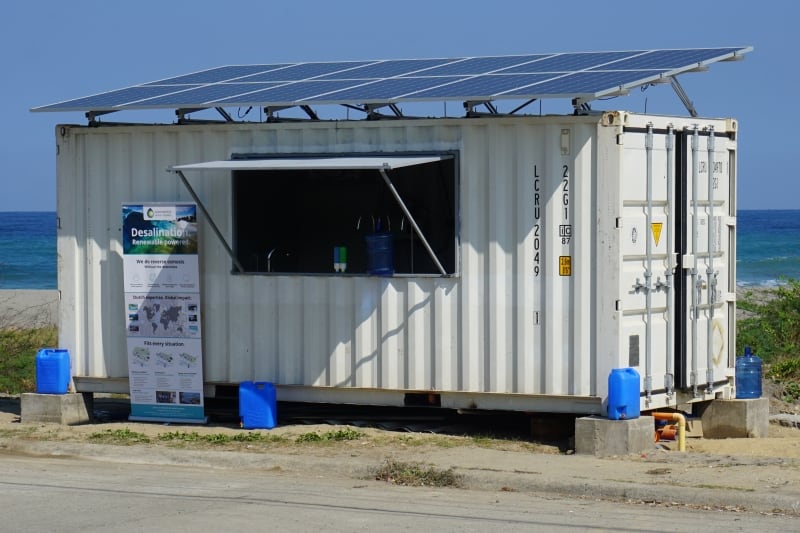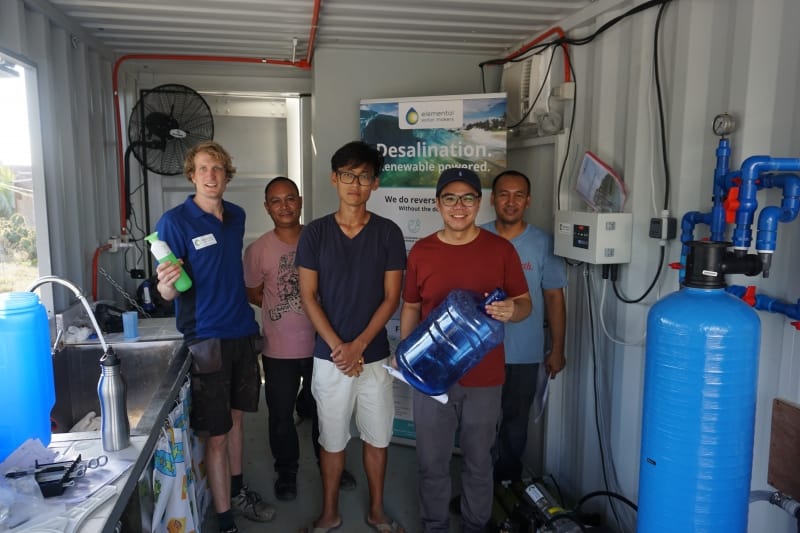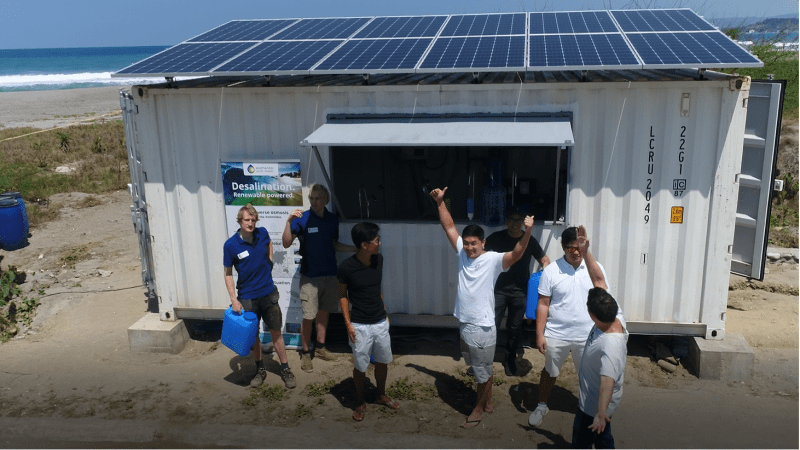Sustainable clean water through solar-powered desalination for water-scarce islands and coastal regions (SDG: 2, 3, 6, 8, 11, 12, 14)
Description
Fresh water, there's no life without it. It's part of everything we do. Unfortunately, already 4 billion people face water scarcity. By harnessing the infinite supply of resources from the sea and sun, Elemental Water Makers developed a decentralized solar-powered desalination solution that offers a sustainable and affordable drinking water supply for the people of La Union in the Philippines. In partnership with a local partner, a containerized desalination unit was installed, which now serves as a water-kiosk that sells affordable, high-quality drinking water to a local population otherwise reliant on more expensive and less sustainable water sources.
The goal of Elemental Water Makers is to solve fresh water scarcity, using only the sea, sun, earth & wind. The objective of Elemental Water Makers is to provide off-grid solar desalination solutions to people living along coastal regions or on islands that are currently unable to sustainably meet their water needs. By combining tech-driven desalination solutions that use the earth and sun’s ample resources, with a people-cantered approach that caters to local needs and ensures independent operation and maintenance, resilient and sustainable water solutions can provide affordable clean water. This directly contributes to the availability and sustainable management of water (SDG6) and the sustainable use of marine resources (SDG14). Specifically, for archipelagos and small island developing states (SIDS) elemental water makers can provide water resilience to adapt to climate change and drought events/disasters. Countries like the Philippines are at the forefront of climate change, with drought occurring more frequently and fresh water sources running dry. Many positive spill-over effects also stem from the acceleration SDG6. For instance, increasing availability and affordability of water reduces the time and money spent on securing water from alternative sources, which is a task often entitled to women and children. Since women and children are now able to easily collect water, their increased available time can be spent on education and self-development, thereby promoting gender equality and time spent on education. Furthermore, ensuring a high-quality drinking water standard decreases the chances of contracting preventable water-related diseases such as diarrhea and cholera and generally contributes to healthy lives and well-being (SDG3). The availability of clean water also promotes local economic development as a reliable water supply enables the exploitation of soil for agriculture where rainfall was previously a bottleneck. Additionally, increasing water availability allows local entrepreneurs to sell water to households and industries (SDG8), which together, makes settlements in remote areas more resilient to the increasing pressure on existing fresh water sources due to climate change and population growth (SDG 11& 14). Economic development is especially relevant for a country with particularly high rates of unemployment (17%), particularly in rural areas (60%), while a large portion (about a third of employment) of labour is active in sectors requiring fresh water, namely agriculture (Central Intelligence Agency, 2018; The Economist, 2017)
Fresh water is a prerequisite for sustainable development anywhere across the globe, making it a fundamental challenge that deserves global attention. While certain regions are fortunate to enjoy considerable time before current freshwater resources become scarce, other geographies such as remote coastal regions and SIDS are on the verge of critical levels of freshwater scarcity, limiting viability of livelihoods, let alone sustainable (economic) development. For the population of La Union, Luzon in the Philippines, the above challenges were significantly mitigated due to an innovative, renewables driven, decentralized solar desalination solutions provided by Elemental Water Makers and a local partner. The rural population, previously dependent on unsustainable and expensive ($6/m3) water sources of questionable quality, are now able to access high-quality drinking water at highly market-competitive rate of (1.3$/m3) while also reducing CO2 emission by 43%, equivalent to savings 11 tons of CO2/year. Apart from mitigating the direct pressure on fresh water resources, additional benefits arose out of the fact local populace took ownership of a water kiosk. The water kiosk is a symbol for the newly gained economic and ecological resilience, which was acquired through independent economic exploitation of a water kiosk, offering opportunities related to economic development and consequently that of self-development, especially for women and children. Through close collaboration with a local partner organization, local ownership was fostered, project implementation was done according to local governance and compliances, access to local resources was facilitated and ultimately operation and management remains in hands of the local population. The above impacts have made the water kiosk project a success, provides evidence for the promise and potential of renewable decentralized desalination solutions for remote/rural communities and provides inspiration for future ‘glocal’ partnerships promoting freshwater resources.
https://www.elementalwatermakers.com/solutions/
https://www.youtube.com/watch?v=26eyaXYIBuI
https://www.dutchwatersector.com/news-events/news/24841-tno-and-element…
https://www.connect4climate.org/story/securing-fresh-water-today-withou…
http://www.glispa.org/glispa-bright-spots/27-emerging-bright-spots/206-…
SDGS & Targets
Deliverables & Timeline
Resources mobilized
Partnership Progress
| Name | Description |
|---|---|
| 14.7 | By 2030, increase the economic benefits to Small Island developing States and least developed countries from the sustainable use of marine resources, including through sustainable management of fisheries, aquaculture and tourism |
Feedback
Action Network


Timeline
Entity
Region
- Asia and Pacific
Geographical coverage
Photos



Website/More information
Countries
Contact Information
Sid Vollebregt, Managing Director
